It is surprising how few books there are about Frederick Douglass. The lack of books about this iconic figure is mostly due to the fact that Douglass himself wrote three great autobiographies, thus reducing the need for more books about his life.
Yet, scholars have recently written a number of new books that are worth exploring. These books cover everything from his personal life to his literary work and even the people around Douglass who influenced who he came to be.
I’ve compiled a list of what are considered the best books about Frederick Douglass. These books are best-sellers on the topic, they have great reviews on sites like Amazon and Goodreads and they received great reviews from critics.
I’ve also used a number of these books in my research for this website so I can personally say they are some of the best on the topic.
The following is a list of the best books about Frederick Douglass:
(Disclaimer: This article contains Amazon affiliate links. As an Amazon Associate I earn from qualifying purchases.)
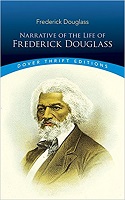 1. Narrative of the Life of Frederick Douglass, an American Slave by Frederick Douglass
1. Narrative of the Life of Frederick Douglass, an American Slave by Frederick Douglass
Published in 1845, this autobiographical book by Frederick Douglass is a memoir that discusses Douglass’ life as a slave and his quest to become free.
The book chronicles his childhood, his few memories of his mother and his family, his move to Baltimore where he learned to write and read, his time as a slave and his escape from bondage.
The book quickly became a best seller, selling 5,000 copies within four months of publication. By 1860, it had sold 30,000 copies.
The book received positive reviews when it was published. On June 10, 1845, the New York Times published a front-page review praising the book:
“Considered merely as narrative, we have never read one more simple, true, coherent and warm with genuine feeling.”
Critics overseas praised the book as well, with the Edinburgh Journal declaring that it “bears all the appearance of truth, and must, we conceive, help considerably to disseminate correct ideas respecting slavery and its attendant evils.”
After the book was published, Douglass had to flee the country to avoid being recaptured by his owner and lived in England and Ireland for two years. Douglass was eventually able to purchase his freedom with funds raised by his supporters.
The book is now considered one of Douglass’ best works and is probably the most famous American slave narrative ever published.
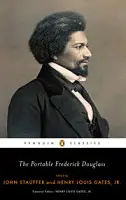 2. My Bondage My Freedom by Frederick Douglass
2. My Bondage My Freedom by Frederick Douglass
Published in 1855, this book is Frederick Douglass’s second autobiography and expands on his first book by discussing his transition from slavery to freedom in greater detail.
In addition to discussing his early years in slavery, the book also discusses Douglass’s experiences with racism in the northern states as a free man, his time overseas in England and Ireland and his activism and includes a 58 page appendix of extracts from Douglass’ speeches.
In the book’s preface, Douglass explains why he wrote the book, stating that he was originally hesitant to write his slave narrative because “I have never placed my opposition to slavery on a basis so narrow as my own enslavement, but rather upon the indestructible and unchangeable laws of human nature…” but eventually agreed to write it because he realized “It is not to illustrate any heroic achievements of a man, but to vindicate a just and beneficent principle, in its application to the whole human family, by letting in the light of truth upon a system, esteemed by some as a blessing, and by others as a curse and a crime.”
The book was reprinted in 1856 and again in 1857, with a total of 18,000 copies printed. The book didn’t sell as well as Douglass’s first autobiography and has always been overshadowed by it but is considered an invaluable resource on Douglass and on slavery in America.
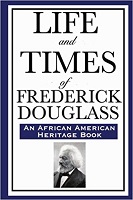 3. The Life and Times of Frederick Douglass by Frederick Douglass
3. The Life and Times of Frederick Douglass by Frederick Douglass
Published in 1881, this book is Frederick Douglass’s third autobiography and expands even more on the inner workings of the Underground Railroad, Douglass’s escape from slavery and also discusses his life during and after the Civil War.
Douglass explains in the book that the reason he didn’t give as many details about the Underground Railroad or how he escaped from slavery in his earlier books was to protect the people who helped him escape and to protect other slaves from being captured when using the same method of escape.
Douglass explained that, for these reasons, he refused to provide these details when slavery still existed and then felt that after slavery was abolished there was no reason to discuss it. He eventually had a change of heart though and decided to divulge these details in this book.
In addition to discussing his life as a slave, the book also discusses Douglass’s friendships with John Brown and Abraham Lincoln, his work recruiting black soldiers for the 54th and 55th Massachusetts regiments, his participation in the women’s suffrage movement, his work with the Council of the District of Columbia and his time as a United States Marshal.
The book unfortunately didn’t sell well since, as Douglass’s publishers explained to him, the “interest in the days of slavery was not as great as we expected.”
Another publisher republished the autobiography in 1893, after revising and expanding it just a few years before Douglass’s death, but that edition didn’t sell either.
This book has also been overshadowed by Douglass’s first autobiography but is considered an important resource on Douglass.
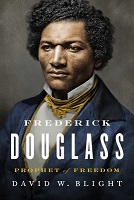 4. Frederick Douglass: Prophet of Freedom by David W. Blight
4. Frederick Douglass: Prophet of Freedom by David W. Blight
Published in 2018, this Pulitzer Prize-winning book by David W. Blight is about how Douglass became the legendary figure that he is.
The book explores the origins and growth of Douglass’s skill as a writer and speaker and attempts to uncover many of the inner thoughts, motivations and conflicts in Douglass’s personal life that Douglass himself neglected to speak of in his own autobiographies,
It also chronicles how Douglass earned the title of “prophet” through the many biblical references in his speeches and stories and how Douglass transformed himself from a radical outsider to a political insider all while trying to balance his public life with his private life.
Blight gathered much of this information from a private collection of a retired doctor, named Walter O. Evans, that few other historians have consulted before now as well as from recently discovered issues of Douglass’s newspaper.
Like all Douglass biographies, the book also leans heavily on Douglass’s autobiographies, which Blight describes as “remarkable” books that “all Douglass scholars are deeply dependent upon.”
The book received positive reviews when it was published. A review by Jennifer Szalai in the New York Times praised the book, calling it scholarly and comprehensive:
“Blight, who has edited and annotated volumes of Douglass’s autobiographies, undertakes this project with the requisite authority and gravity. The result is comprehensive, scholarly, sober; Blight is careful to tell us what cannot be known, including the persistent mystery of Douglass’s father (who was most likely white, and may have been Frederick’s mother’s owner). On the stuff that’s known, Blight is an attentive if sometimes fastidious guide, poring over speeches and texts with the critical equivalent of a magnifying glass. Douglass, Blight says, was a ‘man of words,’ making this book ‘the biography of a voice.’”
A review by Adam Gopnick in the New Yorker called it extraordinary and “a great American biography” even though he does feel Blight takes an “ambivalent tone about Douglass’s seemingly more conventional postwar path” regarding Douglass’s participation in other liberation movements, like women’s suffrage.
A review by fellow Douglass historian, John Stauffer, in the Wall Street Journal referred to the book as moving:
“Mr. Blight’s biography deserves full immersion. Though long, it is absorbing and even moving, and the payoff is enormous, for Mr. Blight displays his lifelong interest in Douglass on almost every page, and his own voice is active and eloquent throughout the narrative. It is a book that speaks to our own time as well as Douglass’s.”
Blight is a history professor at Yale University and is the Director of the Gilder Lehrman Center for the Study of Slavery, Resistance and Abolition.
Blight has written numerous books about the Civil War era, including Frederick Douglass’ Civil War: Keeping Faith in Jubilee; Race and Reunion: The Civil War in American Memory; and A Slave No More: Two Men Who Escaped to Freedom, Including Their Own Narratives of Emancipation.
In 2001, Blight won the Bancroft Prize and the Frederick Douglass Prize and, in 2002, won the Abraham Lincoln Prize for his book Race and Reunion and in 2019 won the Pulitzer Prize for Frederick Douglass: Prophet of Freedom.
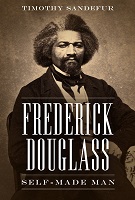 5. Frederick Douglass: Self Made Man by Timothy Sandefur
5. Frederick Douglass: Self Made Man by Timothy Sandefur
Published in 2018, this book by Timothy Sandefur is about the ideas, philosophies and personal motivations that drove Frederick Douglass to become the “self-made man” that he was.
Sandefur argues that Douglass was, above all else, an individualist who believed in personal independence, according to Sandefur in the book’s author’s note:
“In fact, individualism was the centerpiece of his creed – a creed he embraced proudly and with full consciousness. The theme of his life was well stated in the title of his most popular composition, the lecture ‘Self-Made Man,’ which he delivered over 50 times in the last half of his life. ‘Personal independence is a virtue,’ he declared in that lecture, ‘but there can be no independence without a large share of self-dependence, and this virtue cannot be bestowed. It must develop from within.’ Douglass – who taught himself to read, then taught himself the principles of political philosophy, and then rose through his own efforts to become one of the nation’s foremost intellectuals – was preeminently a self-made man. And in his mind, the United States should be a society for the self-made.”
The book received positive reviews when it was published, with many reviewers noting that although the book is shorter than most, it is compact and rich in information.
A review by G. Tracy Mehan III in The American Spectator described the book as compelling and well-researched:
“Timothy Sandefur’s Frederick Douglass: Self-Made Man is well-researched, accessible, and soon, hopefully, to be widely read. Those of us overly mesmerized by the abundant military narratives of the Civil War will profit from the book’s tight, dense description of the intellectual controversies over what was, or became, the final cause of the conflict in Aristotelian terms: slavery and the American constitutional order.”
Timothy Sandefur is a constitutional scholar with the Goldwater Institute’s Scharf-Norton Center for Constitutional Litigation in Phoenix, Arizona.
Sandefur is also the author of numerous books on freedom, individualism and liberty, including The Permission Society: How the Ruling Class Turns Our Freedoms Into Privileges and What We Can Do About It; The Conscience of the Constitution: The Declaration of Independence and the Right to Liberty; Cornerstone of Liberty: Property Rights in 21st Century America.
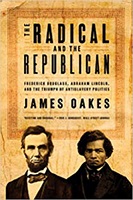 6. The Radical and the Republican: Frederick Douglass, Abraham Lincoln and the Triumph of Antislavery Politics by James Oakes
6. The Radical and the Republican: Frederick Douglass, Abraham Lincoln and the Triumph of Antislavery Politics by James Oakes
Published in 2007, this book by James Oakes is about how Frederick Douglass and Abraham Lincoln gradually became friends and allies.
Oakes argues, in the introduction, that this unlikely friendship between these two iconic figures marks an important moment in American history and represents what can happen when people unite for a common cause:
“Here, then, is the story I want to tell: how Lincoln and Douglass converged at the most dramatic moment in American history. The story commands our attention in part because the two extraordinary personalities are fascinating on their own terms. But there is more to it than that. Lincoln and Douglass, seen together, reveal what can happen in American democracy when progressive reformers and savvy politicians make common cause.”
The book received positive reviews when it was published. A review by Publishers Weekly praised the book for its detailed and keen analysis of its subjects and points out that because Douglass had the more modern political views, the book is “really a study through his eyes of the more complex figure of Lincoln…As Douglass shifts from denouncing Lincoln’s foot-dragging to revering his achievements, Oakes vividly conveys both the immense distance America traveled to arrive at a more enlightened place and the fraught politics that brought it there. ”
Fellow Douglass historian, Timothy Sandefur, described the book in a post on his personal blog as outstanding and praised Oakes as a “fantastic scholar”:
“This is an outstanding book that looks at the relationship between Lincoln and Douglass, and compares their sometimes eerily parallel lives. Oakes is a fantastic scholar on the legal history of abolition—his book Freedom National is totally indispensable—and he does an excellent job of examining the way Douglass influenced and was influenced by, the often tumultuous changes in government policy in those four years, 1861-65. Oakes is particularly good in the way he really gets Lincoln’s careful and considered political maneuvering—something that was just not in Douglass’s character, but which he needed, nevertheless.”
James Oakes is a professor of history at the City University of New York. He taught previously at Princeton University and Northwestern University.
Oakes is also the author of numerous books on slavery and the Civil War, including Freedom National: The Destruction of Slavery in the United States, 1861-1865; The Scorpion’s Sting: Slavery and the Coming of the Civil War; The Ruling Race: A History of American Slaveholders.
In 2013, Oakes won the Lincoln Prize for his book Freedom National, which was also long-listed for the National Book Award.
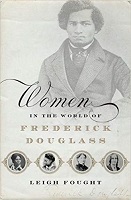 7. Women in the World of Frederick Douglass by Leigh Fought
7. Women in the World of Frederick Douglass by Leigh Fought
Published in 2017, this book by Leigh Fought is about the women in Frederick Douglass’s private life and the influence they had on him.
Fought explains, in the book’s introduction, that she decided to write the book because she felt Douglass’s earlier biographers, and Douglass himself, had completely ignored the contributions made by the women in Douglass’s life:
“This biographical summary touches upon the major moments of his career as provided by Douglass in his autobiographies in which he intended to expose the plight of the African Americans through the lens of his own experience. Although he acknowledged individual women at key moments, he also obscured the degree to which they, at every turn, proved integral to his advancement and protest against racism. His biographers, closely hewing to Douglass’s narrative, pushed women further to the margins, relegating them to standard roles and platitudes about importance without demonstrating their contributions or expressing curiosity about their motivations.”
The book received positive reviews when it was published, with the Wall Street Journal calling it “a fresh and surprising account of Douglass’s life” and Kirkus Reviews echoing that sentiment when it referred to the book as “A fresh and insightful perspective on a major historical figure.”
Fellow Douglass biographer Timothy Sandefur also praised the book in a post on his personal blog, when he described it as an important step in better understanding Douglass’s character:
“…this book unearths archival material to give us a picture of the domestic life of Douglass: his mother, his wives, his daughters, and the guests who stayed, sometimes for years, in his home. Douglass was a very private man, and we know exceedingly little about his first wife, Anna. This book can’t totally fix that, but it is certainly an important step in completing his biography.”
Leigh Fought is an Assistant Professor of History at LeMoyne College. Fought is the author of Southern Womanhood and Slavery: A Biography of Louisa S. McCord; A History of Mystic, Connecticut: From Pequot Village to Tourist Town; and is an editor of The Frederick Douglass Papers: Series Three: Correspondence, Volume 1: 1842-1852.
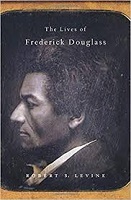 8. The Lives of Frederick Douglass by Robert S. Levine
8. The Lives of Frederick Douglass by Robert S. Levine
Published in 2016, this book by Robert S. Levine provides a more detailed look at Douglass’s large body of work in order to produce a more comprehensive and nuanced view of the iconic figure.
In the introduction to the book, Levine argues that the disproportionate amount of attention paid to Douglass’s first autobiography has distorted and limited the public’s view of Douglass and Levine hopes to correct it by examining all of Douglass’s writings in full:
“The Lives of Frederick Douglass is a book about Douglass as an autobiographer, but with a difference. Rather than focus on the three major autobiographies as discrete texts, subject to close readings and comparison, I consider them as part of a larger autobiographical project that encompasses a wide range of Douglass’s writings…This is a study of the autobiographical Douglass in which there are no stable or fixed texts. Instead, there are three autobiographies, including several versions of those autobiographies…numerous autobiographical lectures, essays, letters, and even a novella, all of which address aspects of Douglass’s life from complementary and sometimes contradictory perspectives…In short, this is a book about autobiography that is also a literary biography.”
The book received positive reviews when it was published, with Kirkus Reviews praising it as astute and thorough:
“In this finely delineated look at Douglass’ writing, Levine urges new readings of his subject’s other autobiographical works, as well as his 1853 novella, The Heroic Slave, in order to grasp a fuller understanding of how Douglass came into his own and began to move away from Garrison’s ‘moral suasion’ to an advocacy of black militancy and beyond… Levine’s exploration of the character of Madison Washington in The Heroic Slave as Douglass’ alter ego and his views of John Brown and President Abraham Lincoln are especially elucidating. An astute, thorough literary study that will invite fresh readings of Douglass’ writing.”
Fellow Douglass historian Timothy Sandefur also had kind words to say about the book in a post on his personal blog:
“This is the book I wish I had written: it examines Douglass’s memoirs to compare the different versions and examine the significance of Douglass’s reworking of his own life. For a compulsive memoirist like Douglass—such a truly self-made man—this sort of analysis is really critical, and Levine has an exceptionally sensitive ear for nuance. Really an excellent work.”
Robert S. Levine is an English professor at the University of Maryland. Levine is the author of numerous books on 19th century history, including Dislocating Race and Nation: Episodes in Nineteenth-Century American Literary Nationalism; Conspiracy and Romance: Studies in Brockden Brown, Cooper, Hawthorne, and Melville; Martin Delany, Frederick Douglass, and the Politics of Representative Identity.
Sources:
Sandefur, Timothy. “What to read about Frederick Douglass.” Sandefur, 9 Feb. 2018, sandefur.typepad.com/freespace/2018/02/what-to-read-about-frederick-douglass.html
“Narrative of the Life of Frederick Douglass, Revisited.” Harvard University Press, www.hup.harvard.edu/features/frederick-douglass/
“The Lives of Frederick Douglass by Robert S. Levine.” Kirkus Review,
Bordewich, Fergus M. ‘Frederick Doulgass, Feminist.” Wall Street Journal, 5 May. 2017, www.wsj.com/articles/frederick-douglass-feminist-1494007183
“Women in the World of Frederick Douglass.” Kirkus Review, www.kirkusreviews.com/book-reviews/leigh-fought/women-in-the-world-of-frederick-douglass/
“The Life and Times of Frederick Douglass.” Frederick Douglass Heritage, www.frederick-douglass-heritage.org/life-and-times-of-frederick-douglass/
McCory, Colin. “The Radical and the Republican: Frederick Douglass, Abraham Lincoln, and the Triumph of Antislavery Politics, by James Oakes.” Journal of the Abraham Lincoln Association, quod.lib.umich.edu/j/jala/2629860.0029.207/–radical-and-the-republican-frederick-douglass-abraham?rgn=main;view=fulltext
“Nonfiction Book Review: The Radical and the Republican: Frederick Douglass, Abraham Lincoln, and the Triumph of Antislavery.” Publisher’s Weekly, www.publishersweekly.com/978-0-393-06194-9
“List of Books and Articles About Frederick Douglass.” Questia, www.questia.com/library/literature/nonfiction/frederick-douglass
Mehan III, G Tracy. “Nothing is Settled that is Not Right.” The American Spectator, 21 Aug. 2018, spectator.org/nothing-is-settled-that-is-not-right/
McCrum, Robert. “The 100 Best Nonfiction Books: No 68 – Narrative of the Life of Frederick Douglass, an American Slave by Frederick Douglass (1845),” The Guardian, 22 May. 2017, www.theguardian.com/books/2017/may/22/narrative-life-frederick-douglass-american-slave-review
Szalai, Jennifer. “A Big New Biography Treats Frederick Douglass as Man, Not Myth.” New York Times, 17 Oct. 2018, www.nytimes.com/2018/10/17/books/review-frederick-douglass-prophet-of-freedom-david-blight.html
Stauffer, John. “’Frederick Douglass’ Review: His Tongue the Pen of God.” Wall Street Journal, 11 Oct. 2018, www.wsj.com/articles/frederick-douglass-review-his-tongue-the-pen-of-god-1539308605
Friedman, Nadine. “The 4 best Frederick Douglass Biographies and Memoirs.” Signature Reads, 14 Feb. 2013, www.signature-reads.com/2013/02/the-4-best-frederick-douglass-biographies-and-memoirs/
Pin it for later:
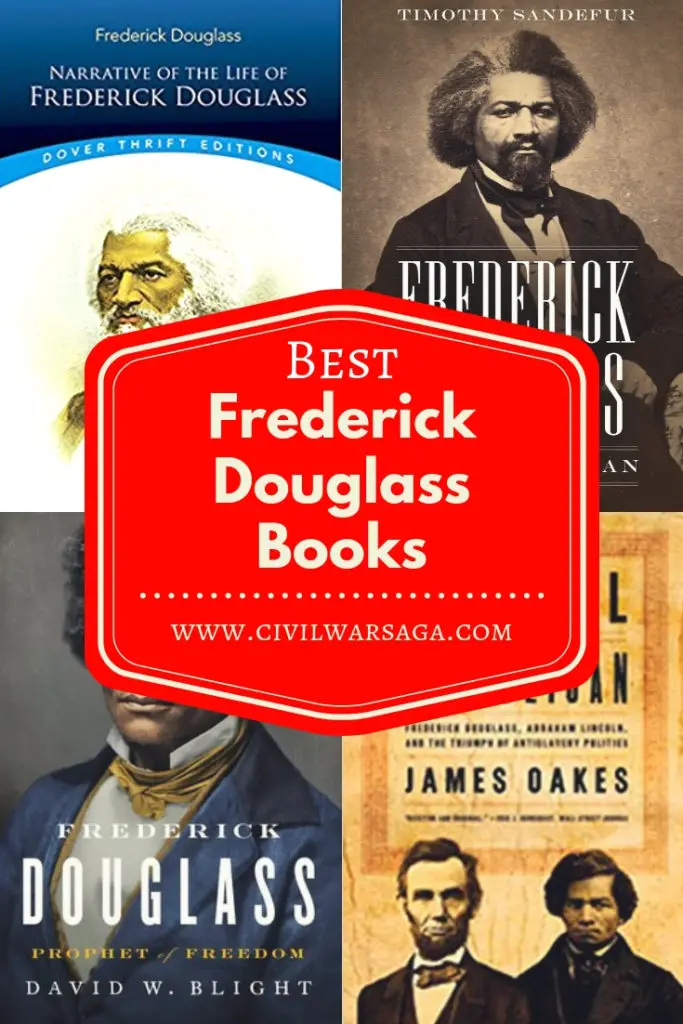


Not included in your list of Douglass biographies is what appears to be the earliest one, published in 1893, author James Monroe Gregory: Frederick Douglass the Orator.
Thank you for your comprehensive analysis of the best books on Frederick Douglass. With so much attention made of Blight’s book, and my disregard of current Pulizter Prize choices, I needed guidance on where to start reading about this singular man. You, and well as other authors, recommend starting with Douglass’s own words, so I chose your 2nd, My Bondage and My Freedom. I so appreciate your gift.